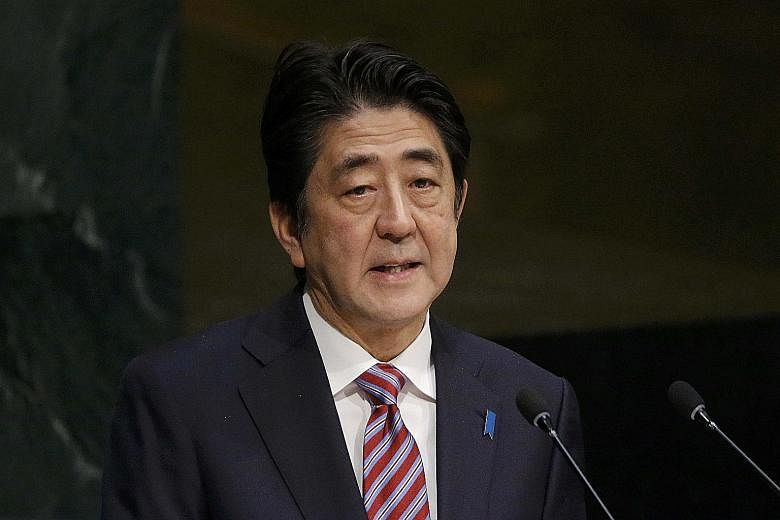TOKYO • Almost three years into Prime Minister Shinzo Abe's administration and his launch of a three-pronged economic strategy of monetary and fiscal expansion and structural reforms, there's increasing concern Japan is making the mistake of insufficiency with regard to freeing up regulations on businesses and workers. The cost could be a third lost decade.
"The clock is ticking for Abenomics," said Dr Paul Sheard, chief global economist at Standard & Poor's in New York, who spent 17 years in Japan over a span of three decades.
"If Japan is serious about increasing growth, there needs to be a Copernican revolution on structural policies of the same magnitude as the revolution that's taken place at the BOJ."
The latest survey from the central bank - the Tankan Index - showed sentiment among large manufacturers worsening as it fell to 12 in September from 15 in June. The index is forecast to drop to 10 in December.
There is growing concern that Japan's economy may have contracted in the quarter that has just ended, which would tip the nation into its second recession since Mr Abe took office in 2012.
Weakness in the Japanese economy and the slowdown in Asia are chipping away at the nation's business confidence. Large companies that have benefited from the weak yen and rising profits under Mr Abe have yet to make a significant commitment to expanding domestic investment.
Both Mr Abe and Bank of Japan governor Haruhiko Kuroda have said investment and wage growth are needed to keep the economy out of deflation and on a growth path.
"The Tankan results indicate that Japan's outlook remains grim," said Mr Yuichi Kodama, an economist at Meiji Yasuda Life Insurance in Tokyo. Mr Kodama, who estimates the economy contracted by an annualised 0.9 per cent last quarter, said large manufacturers are less confident about Japan's outlook because exports are sluggish with the slowdown in China.
Mr Kuroda has embraced stimulus on an unprecedented scale, a visible positive of Mr Abe's monetary policy. Mr Kuroda revved up the quantitative easing engine with purchases of assets, which have essentially succeeded in ending entrenched deflation - consumer prices rose 1.6 per cent and 2.3 per cent in the first and second fiscal years of his term, boosted in part by a sales tax rise.
But businesses have proved reluctant to boost investment at home. One big reason: Even under Mr Abe's target to stop Japan's population decline at 100 million, from 127 million now, there would be a 21 per cent contraction in the number of Japanese in coming decades.
That leaves Japan stuck with a stop-go economy, where occasional contractions are followed by spurts of growth.
Mr Abe's decision to proceed with a sales tax increase last year tipped the country into a recession. And there is an increasing risk of another one this year. He has made progress in some areas of reform, including spurring companies to focus more on shareholder returns and reducing the hold of the largest farm lobby on Japan's agricultural business.
Yet the most important areas for change have scarcely been addressed, observers say - especially in encouraging flexibility in the labour market and an influx of foreigners to help ease the growing shortage of workers.
"What has happened is 180 degrees opposite of what we expected at the start of Abenomics" back in 2012, said Mr Hiromichi Shirakawa, chief Japan economist at Credit Suisse Group. "If Japan fails in boosting its supply potential, we think the economy will hit a wall," he said, with trend growth rates below 1 per cent.
BLOOMBERG

